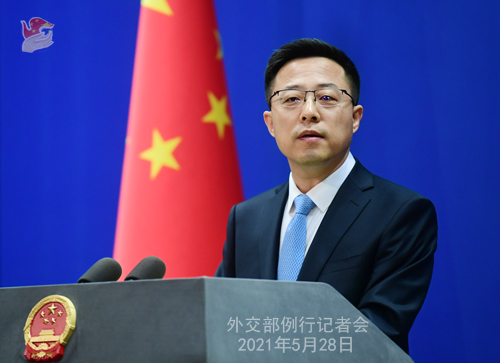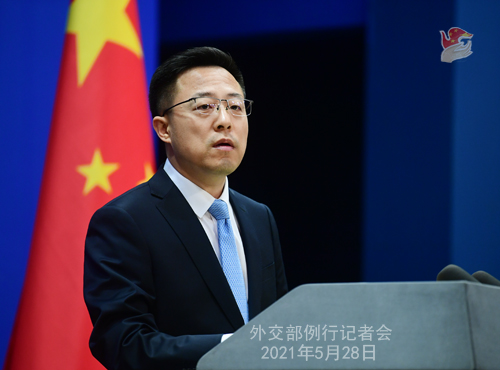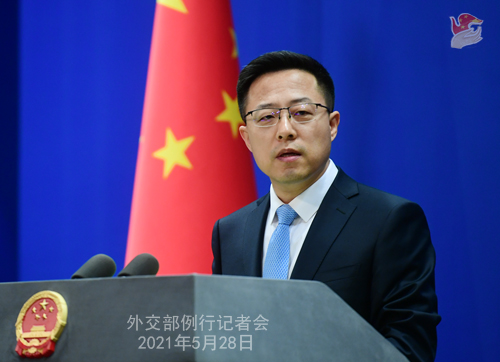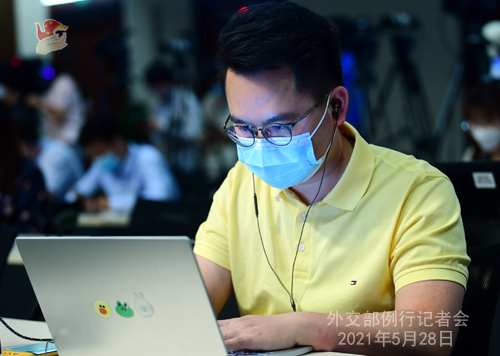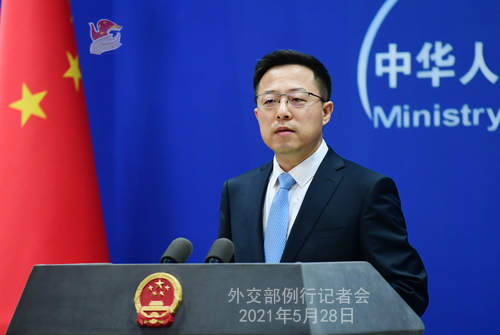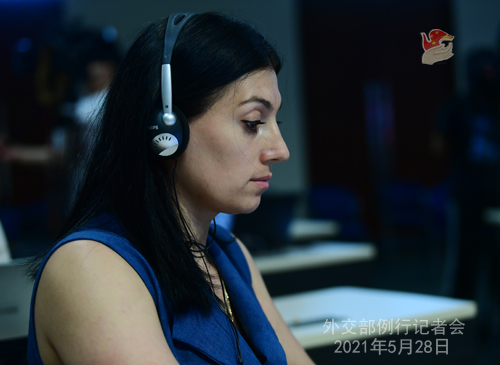| Foreign Ministry Spokesperson Zhao Lijian's Regular Press Conference on May 28, 2021 |
| 2021-05-28 19:25 |
|
Li Keqiang, Premier of the State Council, will attend upon invitation the second summit of Partnering for Green Growth and the Global Goals 2030 (P4G) via videoconference on May 30. At the invitation of State Councilor and Foreign Minister Wang Yi, Polish Foreign Minister Zbigniew Rau, Serbian Foreign Minister Nikola Selaković, Irish Minister for Foreign Affairs and Defence Simon Coveney, and Hungarian Minister of Foreign Affairs and Trade Péter Szijjártó will visit China from May 29 to 31. Xinhua News Agency: The Chinese side invited four European foreign ministers to visit China. Could you please share more details on that? And what are China's expectations for this visit? Zhao Lijian: Poland, Serbia, Ireland and Hungary are China's important cooperation partners in Europe, and have long been engaged in friendly relations with China. After the outbreak of the COVID-19, we stood together with mutual assistance, carried out active cooperation to fight the virus and promoted the resumption of work and production. As a result, we deepened our friendship, expanded areas of cooperation, and boosted our bilateral relations. During the visit, State Councilor and Foreign Minister Wang Yi will host talks with the four foreign ministers respectively, and exchange views on bilateral relations, regional cooperation, China-Europe relations and other issues of common concerns. China hopes to enhance political mutual trust and deepen pragmatic cooperation with the above four countries through this visit, and jointly promote post-pandemic economic recovery, so as to inject new impetus to China's relations with the four countries, and achieve comprehensive and balanced development of China-Europe relations. CCTV: You just announced that Premier Li Keqiang will attend the 2021 P4G Seoul Summit. Could you share China's expectations for the event? Zhao Lijian: To address climate change, a major challenge faced by mankind, we must uphold multilateralism and pool the strength of all countries. By attending the summit upon invitation, Premier Li Keqiang is demonstrating China's sense of responsibility as a major country in taking an active part in and leading global climate governance and boosting post-pandemic green recovery. The Earth is our common home. As COVID-19 continues to spread and global economic recovery faces enormous challenges, China stands ready to work together with the international community to advance global environmental governance, facilitate an inclusive green global recovery, and foster a community of life for man and Nature.
China News Service: Recently, the Ministry of Foreign Affairs held the first workshop for the diplomats of Arabian countries in China. Could you please tell us more about it? Zhao Lijian: At the request of diplomatic missions of Arabian countries, the Chinese Ministry of Foreign Affairs held the first workshop for the diplomats of Arabian countries posted in China, from May 23 to 28 in Shanghai. During the workshop, the Chinese side offered lectures on a variety of topics, including the history of CPC, the new development philosophy and paradigm, the 14th five-year plan, COVID-19 response, China's foreign diplomacy and China's ethnic and religious policies. The participants also toured around Xingjian via video link and went to pay tribute to the red boat on Nanhu Lake in Jiaxing City, Zhejiang Province. Participating diplomats found the lectures offered at the workshop quite useful in helping deepen their understanding of the CPC and China, and looked forward to more opportunities for such studies in the future. They expressed congratulations on the upcoming centenary of the CPC, and spoke highly of China's reform and development philosophy and success in governing the country, saying that China's development has created opportunities for the world. The diplomats applauded China's foreign policy. They highly appreciated the five-point initiative on achieving security and stability in the Middle East put forward by State Councilor and Foreign Minister Wang Yi during his recent visit to the region as well as China's outstanding role in working towards a deescalation of Palestine-Israel conflict, and would like to see China play a greater role in regional affairs. They also expressed willingness to serve as a bridge to promote China-Arab states practical cooperation across the board and exchange of experience in governance, so as to boost the upgrading of the China-Arab states strategic partnership. Phoenix TV: On May 27, the Hong Kong Legislative Council approved the Improving Electoral System (Consolidated Amendments) Bill 2021. US Secretary of State Antony Blinken said the bill severely constrains people in Hong Kong from meaningfully participating in their own governance. He also called on Chinese authorities to release and drop charges against all individuals charged under the National Security Law. What is China's comment on this? Zhao Lijuan: China is strongly dissatisfied with and firmly opposed to US flagrant smearing against the local legislation on improving the electoral system in the Hong Kong Special Administrative Region (HKSAR). I want to stress that China is a country with rule of law. The HKSAR's comprehensive completion of this local legislation is an important measure to follow through on the relevant decision of the National People's Congress (NPC) and the spirit of the amendments made by the NPC Standing Committee. It will plug the loopholes in the previous electoral system, reaffirm the new order of "patriots administering Hong Kong", and enable the democratic system of Hong Kong to move forward steadily along the sound and orderly track. It will also provide more solid guarantee to achieving good governance in Hong Kong, and better uphold national sovereignty, security and development interests and Hong Kong's prosperity and stability in the long run. Relevant remarks by the US side groundlessly accuse China's central government, the HKSAR government and the Legislative Council in disregard of facts. While claiming to care about Hong Kong's democracy and Hong Kong residents' rights, what the US is really up is to meddle in Hong Kong's politics and China's domestic affairs. I must stress once again that Hong Kong is a special administrative region of China. Therefore, Hong Kong affairs, including the reform of the electoral system, are purely China's domestic affairs. The US side should respect basic norms governing international relations and immediately stop interfering in Hong Kong affairs and other China's internal affairs.
Global Times: Japan's Reconstruction Agency reportedly raised Fukushima nuclear accident-related publicity expenditure dramatically to 2 billion yen in its 2021 budget, four times the 2020 level. After combing through relevant information, the media found out that the Reconstruction Agency has been hiring professional publicity teams to reduce and remove negative opinions resulting from the nuclear accident in various means. Some commented that the budget increase is part of the preparation to deal with opposition to releasing nuclear contaminated water into the sea. Do you have any comment? Zhao Lijian: I've noted relevant reports. I also noticed that on the same day the Japanese government made the unilateral decision to discharge the Fukushima nuclear contaminated water into the ocean, the Reconstruction Agency released a flyer and video on its website featuring the radioactive substance tritium as a harmless mascot in an attempt to brainwash Japanese nationals. However, as soon as the cartoon character was released, there was an outrage at home and abroad. People across Japan including in Fukushima took to the streets to voice their astonishment and disapproval over the government's decision, urging it to listen to public opinion and not to discharge the water into the sea. For over a month, many governments, experts, media agencies and civil groups have been speaking about the grave harm ocean discharge will pose on global ecology and human health and urging Japan to act prudently and reverse the wrong decision. Clearly Japan's series of attempts to whitewash itself have not succeeded in dispelling concerns at home, let alone fooling the international community. Japan would rather rack its brains to cover things up than take concrete measures to solve the problem. Is this how its self-professed "sense of responsibility" to the international community looks like? It has deep pockets to conduct publicity campaigns, but chooses to tighten the purse strings when it comes to disposal of the nuclear contaminated water. By choosing the wrong course of action, Japan will bankrupt its own credibility and must bear the grave consequences of damage to mankind's common interest. At stake here is the health of all human beings and the global ecological environment. Japan's reckless behavior must be condemned by justice and conscience. RIA Novosti: Incumbent President Bashar Assad won the presidential elections in Syria with 95.1 percent of the vote. Does China have any comment? Has China sent congratulatory message to President Assad? Zhao Lijian: China congratulates President Bashar on his re-election. This year marks the 65th anniversary of the establishment of diplomatic ties between China and Syria featured by longstanding friendship. China firmly supports Syria's efforts in safeguarding its national sovereignty, independence and territorial integrity, and stands ready to work with Syria to take the 65th anniversary as an opportunity to achieve new progress in our friendly cooperation. As for the congratulatory message you mentioned, China will handle the issue in accordance with customary practice.
Bloomberg: The US Senate has taken a step toward passing a bill to bolster US economic competitiveness and confront China's rise. It would devote spending in R&D and domestic semiconductor manufacturing. The bill also includes measures directly targeting China on human rights and its influence in the US. Similarly, US Secretary of Commerce Gina Raimondo said the Biden administration's jobs plan is "all about competing with China". Does the foreign ministry have a response to this broad approach that the US is taking to confront and compete with China? One more question, Japan is considering offering some of its supply of the AstraZeneca vaccine to Taiwan, according to a newspaper report. A spokesman for Taiwan's presidential office has indicated that such an offer would be welcomed. Does the ministry have a comment? Zhao Lijian: On your first question, recently China has repeatedly stated its solemn position on continued US Congress action regarding legislation with negative content on China. The legislation disregards facts, hypes up the so-called "China threat" and "malign influence", calls for all-out strategic competition with China, and even lobbies for a decoupling and confrontation between China and the US. Such unpopular moves run counter to the aspiration for bilateral exchange and cooperation shared by people in both countries and beyond. China firmly rejects them. China's objective is never about overtaking, replacing or outcompeting the US, but about constant self-improvement to become a better version of China and enable the Chinese people to lead better lives. As the world's top two economies, China and the US have highly intertwined interests. Our cooperation in such areas as economy, trade, science and technology and education is mutually beneficial in nature. Both China and the US stand to gain from cooperation and lose from confrontation. Working together, we can achieve great things in the benefit of both countries and the world while confrontation spells disaster for both countries and the world. I'd like to reiterate that China is committed to forging a relationship with the US featuring no conflict, no confrontation, mutual respect and win-win cooperation. At the same time, we will continue to firmly safeguard our sovereignty, security and development interests. We urge the US to adjust its mindset, look at China and China's development in a rational light, respect the Chinese people's legitimate right to development and stop pushing negative legislation on China to avoid undermining China-US relations and cooperation in important areas. On your second question, I stated China's position on the Taiwan region's access to vaccines yesterday. The channel for China's Taiwan region to obtain vaccines from the mainland is unfettered. The Taiwan authorities' attempt to seek independence by exploiting the issue of vaccines won't succeed. Kyodo News: Japan and the EU held a summit yesterday and released a joint statement, which explicitly stressed the importance of peace and stability across the Taiwan Strait and called for peaceful settlement of the Taiwan question. Do you have a comment? Zhao Lijian: The above-mentioned remarks by Japan and Europe have completely gone beyond the scope of normal development of bilateral relations, and are harmful to international peace and stability, mutual understanding and trust among regional countries, and the interests of a third party. This obviously runs counter to their stated goal of "building a more secure, democratic and stable world". China deplores and rejects relevant remarks in the joint statement of the Japan-EU summit, and will continue to firmly defend its national sovereignty, security and development interests. For quite a while, driven by selfish intention of containing China and in total disregard of the basic norms governing international relations, the Japanese government has made an issue out of China on various occasions, portraying China as a threat, ganging up with a few others to pursue geopolitical confrontation, throwing mud at China based on lies and false information, and grossly interfering in China's internal affairs. Japan's wrong approach goes against the trend of the times of win-win cooperation and have brought adverse effects on bilateral relations and regional stability. I'd like to emphasize once again that the affairs of Hong Kong and Xinjiang are purely China's internal affairs. There are no human rights issues whatsoever, and no foreign government, organization or individual has the right to interfere. Taiwan constitutes part of China's territory. China will never allow any country to interfere in Taiwan-related issues in any way. China must and will be reunified. As far as the situation across the Taiwan Strait is concerned, reunification is the best solution to maintaining regional and world peace and stability. The Japanese side is advised not to stretch its arm too long, still less stir up trouble everywhere. Regarding maritime issues, with the concerted efforts of relevant regional countries, the situation in the East China Sea and the South China Sea is generally stable. China resolutely safeguards national territorial sovereignty and maritime rights and interests, and at the same time, stands ready to properly settle maritime disputes with countries concerned through consultation and negotiation, to jointly safeguard regional peace and tranquility. As for the handling of nuclear contaminated water from Fukushima, since the Japanese side attaches such great importance to maritime issues, why does Japan ignore its due international responsibilities and obligations? Why turning a blind eye to lives and well-being of mankind, and global maritime cleanness and safety? And why not revoke its release decision immediately? The Japanese side keeps talking about freedom and openness. Does it mean freedom of release? I would like to stress that on dealing with China, megaphone diplomacy is not the right approach, attacks and smears will backfire, ganging up won't help, and coercion and confrontation is a dead end. We hope Japan will know better than to go further down the wrong path.
Beijing Youth Daily: On May 27, the 75th UN General Assembly adopted a resolution outlining terms for negotiating a cybercrime treaty, confirming that the negotiation will start in January 2022. What is China's comment? Zhao Lijian: China welcomes the adoption of the UNGA resolution to commence negotiation for a cybercrime treaty. Cybercrime is a common challenge faced by all countries in the world, which calls for international cooperation. China will take a constructive part in the negotiation, and work closely with all parties to jointly push for an authoritative and universal convention at an early date, so as to provide a practical and effective solution for the international community to cope with the challenges of cybercrime. China Review News: On May 27, US President Biden said that a report may be released to share in detail the findings of the US intelligence community on the origin of the novel coronavirus. It seems that the US intelligence agencies are beginning to voice their views on the topic of origin-tracing, saying that they will continue to study all the evidence, collect and analyze new information. What is China's comment on this? Zhao Lijian: Origin-tracing is a serious scientific issue, and yet the US intends to let its intelligence service play a leading role in conducting the research. This only shows that facts and truth is the last thing the US side cares about. It has zero interest in scientific research, but is only seeking political manipulation for the purpose of scapegoating. The US side has been clamoring for an "investigation" on the "laboratory leak" theory hyped up by the US with an ill intention and ulterior motive. I want to remind those in the US of two points. First, it is clearly written in the WHO-China joint mission report that "a laboratory origin of the pandemic was considered to be extremely unlikely". Second, it is the US that has the largest scale and the highest number of bio-labs in the world with media coverage exposing the virus leak at the bio-chemical research base Fort Detrick. According to public information, Fort Detrick is inextricably linked with Unit 731, a covert biological and chemical warfare research and development unit of the Imperial Japanese Army that undertook lethal human experimentation during the Japanese aggression war against China. Shiro Ishii, who was in charge of this heinous unit, was also the bio-weapon consultant of Fort Detrick. When does the US plan to give an explanation in detail on the respiratory diseases of unknown causes in Northern Virginia in July 2019 and large-scale EVALI outbreaks in Wisconsin? Does the US side have the will and courage to invite WHO experts for investigation?
|
| |||||||||||||||
|
|||||||||||||||


